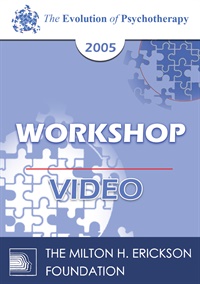
- Average Rating:
- Not yet rated
- Topic Areas:
- Psychotherapy | Topical Panels | Art and Creativity
- Categories:
- Evolution of Psychotherapy | Evolution of Psychotherapy 2009
- Faculty:
- Steven Hayes, PhD | James Hillman, PhD | Erving Polster, PhD
- Duration:
- 56 Minutes
- Format:
- Audio Only
- Original Program Date:
- Dec 12, 2009
- Short Description:
- EP09 Topical Panel 17 – Psychotherapy: Art or Science? – Steven Hayes, James Hillman, and Erving Polster Educational Objective: To compare and contrast clinical and philosophical perspectives of experts.
- Price:
- $15.00 - Base Price
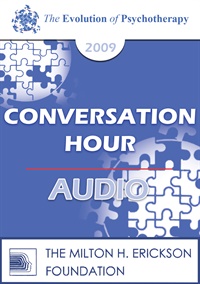
- Average Rating:
- Not yet rated
- Topic Areas:
- Conversation Hours | Psychotherapy
- Categories:
- Evolution of Psychotherapy | Evolution of Psychotherapy 2009
- Faculty:
- James Hillman, PhD
- Duration:
- 1 Hour 4 Minutes
- Format:
- Audio Only
- Original Program Date:
- Dec 12, 2009
- Short Description:
- EP09 - Conversation Hour 17 - James Hillman, PhD
- Price:
- $15.00 - Base Price
Tags: James Hillman Psychotherapy
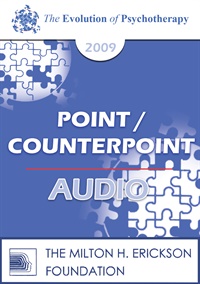
- Average Rating:
- Not yet rated
- Topic Areas:
- Point/Counterpoint Sessions | Suicide | Psychotherapy
- Categories:
- Evolution of Psychotherapy | Evolution of Psychotherapy 2009
- Faculty:
- James Hillman, PhD
- Duration:
- 1 Hour 23 Minutes
- Format:
- Audio Only
- Original Program Date:
- Dec 12, 2009
- Short Description:
- An expanded understanding of the suicidal urge, and reasoning, belongs to the capability of any therapist, since suicide is always a human potential. The therapist needs to come to terms with his/her own suicidal urges, fears and fantasies, and ideas of death as well. Objective reports – diagnosis, demographics, age groups, psychological situation, social history, personal styles, etc. may or may not help the practitioner in encountering the client’s risk of suicide.
- Price:
- $15.00 - Base Price
- Average Rating:
- Not yet rated
- Topic Areas:
- Clinical Demonstrations | Interviewing | Psychotherapy | Meditation, Spirituality and Yoga
- Categories:
- Evolution of Psychotherapy | Evolution of Psychotherapy 2009
- Faculty:
- James Hillman, PhD
- Course Levels:
- Master Degree or Higher in Health-Related Field
- Duration:
- 52:02
- Format:
- Audio and Video
- Original Program Date:
- Dec 11, 2009
- Short Description:
- EP09 Clinical Demonstration 07 – Case History/Soul History - James Hillman, PhD
- Price:
- $59.00 - Base Price

- Average Rating:
- Not yet rated
- Topic Areas:
- Psychotherapy | Dialogues
- Categories:
- Evolution of Psychotherapy | Evolution of Psychotherapy 2009
- Faculty:
- James Hillman, PhD | Sue Johnson, EdD
- Duration:
- 1 Hour
- Format:
- Audio Only
- Original Program Date:
- Dec 11, 2009
- Short Description:
- Educational Objective: Given a topic, to describe the differing approaches to psychotherapy, and to identify the strengths and weaknesses of each approach.
- Price:
- $15.00 - Base Price

- Average Rating:
- Not yet rated
- Topic Areas:
- Clinical Demonstrations | Meditation, Spirituality and Yoga | Psychotherapy | Interviewing
- Bundle(s):
- Pioneers of Psychotherapy Bundle
- Categories:
- Pioneers of Psychotherapy | Evolution of Psychotherapy | Evolution of Psychotherapy 2009
- Faculty:
- James Hillman, PhD
- Course Levels:
- Master Degree or Higher in Health-Related Field
- Duration:
- 00:53:00
- Format:
- Audio and Video
- Original Program Date:
- Dec 10, 2009
- Short Description:
- James Hillman (2009) Hillman reveals how to bring “soul talk” back into modern psychotherapy. The case history of a client is the diagnosis, present complaint, family history, employment history, but nothing of the “soul” of the person. Dr. Hillman assures us that we can almost ignore the case history. Using “soul” talk (Longings, dreams, secrets, how a client accepts joy and sorrow) takes the session out of the box and returns a resonance to psychotherapy that it has lost.
- Price:
- $59.00 - Base Price
- Average Rating:
- Not yet rated
- Topic Areas:
- Workshops | Dreamwork | Psychotherapy
- Categories:
- Evolution of Psychotherapy | Evolution of Psychotherapy 2005
- Faculty:
- James Hillman, PhD
- Course Levels:
- Master Degree or Higher in Health-Related Field
- Duration:
- 1:52:44
- Format:
- Audio and Video
- Original Program Date:
- Dec 11, 2005
- Short Description:
- Dreaming is a natural human function from early childhood to late maturity. Beginning with Freud and Jung the practice of clinical psychology centered originally on dream analysis. The importance of dreaming has fallen into neglect in most contemporary therapies. This workshop offers practical cues for working with dreams to benefit participants own techniques, selfknowledge and their client's psychic equilibrium.
- Price:
-
Sale is $29.00
price reduced from Base Price - $59.00
Tags: Dreams James Hillman Psychotherapy
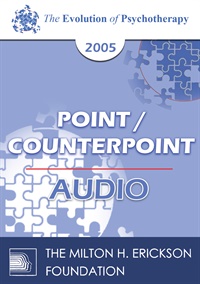
- Average Rating:
- Not yet rated
- Topic Areas:
- Point/Counterpoint Sessions | Psychotherapy | Therapist Development
- Categories:
- Evolution of Psychotherapy | Evolution of Psychotherapy 2005
- Faculty:
- James Hillman, PhD | Donald Meichenbaum, PhD
- Duration:
- 1 Hour 19 Minutes
- Format:
- Audio Only
- Original Program Date:
- Dec 10, 2005
- Short Description:
- The client comes for help because he/she is "deeply" troubled. These "deeps" lurking inside problems need to be spoken about by the client and spoken to by the therapist/counselor. Otherwise practice fails its promise and becomes a bag of tricks for fixing problems.
- Price:
- $15.00 - Base Price
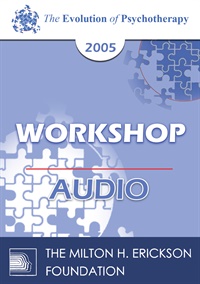
- Average Rating:
- Not yet rated
- Topic Areas:
- Topical Panels | Transference / Countertransference | Psychotherapy
- Categories:
- Evolution of Psychotherapy | Evolution of Psychotherapy 2005
- Faculty:
- James Hillman, PhD | Otto Kernberg, MD | James F. Masterson, MD | Michael White, B.A.S.W.
- Duration:
- 1 Hour
- Format:
- Audio Only
- Original Program Date:
- Dec 10, 2005
- Short Description:
- Topical Panel 15 from the Evolution of Psychotherapy 2005 - Transference / Countertransference Featuring James Hillman, PhD; Otto Kernberg, MD; James Masterson, MD; and Michael White, BASW Moderated by Ellyn Bader, PhD
- Price:
- $15.00 - Base Price
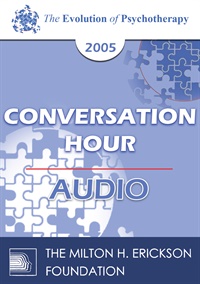
- Average Rating:
- Not yet rated
- Topic Areas:
- Conversation Hours | Psychotherapy
- Categories:
- Evolution of Psychotherapy | Evolution of Psychotherapy 2005
- Faculty:
- James Hillman, PhD
- Duration:
- 59:38
- Format:
- Audio Only
- Original Program Date:
- Dec 09, 2005
- Short Description:
- Conversation Hour 05 from the Evolution of Psychotherapy 2005 - James Hillman, PhD
- Price:
- $15.00 - Base Price
Tags: James Hillman Psychotherapy

- Average Rating:
- Not yet rated
- Topic Areas:
- Dialogues | Social Issues | Psychotherapy
- Categories:
- Evolution of Psychotherapy | Evolution of Psychotherapy 2005
- Faculty:
- Mary Goulding, MSW | James Hillman, PhD
- Duration:
- 58 Minutes
- Format:
- Audio Only
- Original Program Date:
- Dec 09, 2005
- Short Description:
- Dialogue 02 from the Evolution of Psychotherapy 2005 - Politics and Therapy Featuring Mary Goudling, MSW, and James Hillman, PhD Moderated by Jon Carlson, PsyD, EdD
- Price:
- $15.00 - Base Price
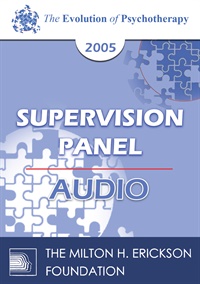
- Average Rating:
- Not yet rated
- Topic Areas:
- Supervision Panels | Supervision | Psychotherapy
- Categories:
- Evolution of Psychotherapy | Evolution of Psychotherapy 2005
- Faculty:
- James Hillman, PhD | Arnold Lazarus, Ph.D. | Scott Miller, PhD
- Duration:
- 57 Minutes
- Format:
- Audio Only
- Original Program Date:
- Dec 09, 2005
- Short Description:
- Supervision Panel 03 from the Evolution of Psychotherapy 2005 Featuring James Hillman, PhD; Arnold Lazarus, PhD; and Scott Miller, PhD Moderated by Ellyn Bader, PhD
- Price:
- $15.00 - Base Price

- Average Rating:
- Not yet rated
- Topic Areas:
- Psychotherapy | Dialogues
- Categories:
- Evolution of Psychotherapy | Evolution of Psychotherapy 2000
- Faculty:
- James Hillman, PhD | Thomas Szasz, MD
- Duration:
- 57 Minutes
- Format:
- Audio Only
- Original Program Date:
- May 28, 2000
- Short Description:
- EP00 Dialogue 10 - Critique of Therapy - James Hillman, Ph.D., and Thomas Szasz, M.D. Given a topic, to become aware of the differing approaches to psychotherapy, and to identify the strengths and weaknesses in each approach. Moderated by Bernhard Trenkle, Dipl. Pysch.
- Price:
- $15.00 - Base Price

- Average Rating:
- Not yet rated
- Topic Areas:
- Invited Addresses | Meditation, Spirituality and Yoga | Psychotherapy
- Categories:
- Evolution of Psychotherapy | Evolution of Psychotherapy 2000
- Faculty:
- James Hillman, PhD | Donald Meichenbaum, PhD
- Duration:
- 1 Hour 28 Minutes
- Format:
- Audio Only
- Original Program Date:
- May 28, 2000
- Short Description:
- Besides the patient's past history and present intrapsychic complaints, besides his/her interpersonal relations, the patient lives in an aesthetic, spiritual, cultural, economic and environmental world of intimate things, physical places and invisible atmospheres. To focus mainly upon personal subjectivity to the neglect of the non-human factors falsifies the patient's daily actuality and endangers therapy with artificiality. Therapy must therefore bridge into the world.
- Price:
- $15.00 - Base Price

- Average Rating:
- Not yet rated
- Topic Areas:
- Topical Panels | Goals of the Therapist | Therapist Development
- Categories:
- Evolution of Psychotherapy | Evolution of Psychotherapy 2000
- Faculty:
- Bert Hellinger, MA, Dipl. Psych | James Hillman, PhD | Arnold Lazarus, Ph.D. | Miriam Polster
- Duration:
- 57 Minutes
- Format:
- Audio Only
- Original Program Date:
- May 27, 2000
- Short Description:
- Topical Panel 10 from the Evolution of Psychotherapy 2000 - The Goal of Therapy Featuring Bert Hellinger, MA, Dipl. Psych., James Hillman, PhD, Arnold Lazarus, PhD, and Miriam Polster, PhD. Moderated by Brent Geary, PhD.
- Price:
- $15.00 - Base Price

- Average Rating:
- Not yet rated
- Topic Areas:
- Invited Addresses | Psychotherapy
- Categories:
- Evolution of Psychotherapy | Evolution of Psychotherapy 1995
- Faculty:
- James Hillman, PhD | Irvin Yalom, PhD
- Duration:
- 1 Hour 28 Minutes
- Format:
- Audio Only
- Original Program Date:
- Dec 17, 1995
- Short Description:
- "Character is Fate"-this classic idea is coming around again in the new molecular biology that attributes deep-set personality traits to heredity. Can therapists sort out what belongs to development and may be influenced by therapy and what belongs to character and is authentic to the soul? Moreover, if congenital character is a major determinant in case history, then the events of childhood need to be revisioned, not only as traumatic errors but as previews, and even as necessary components of fate.
- Price:
- $15.00 - Base Price
Tags: James Hillman Psychotherapy
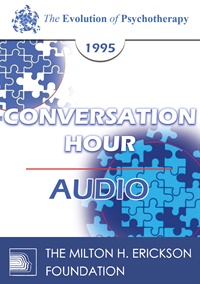
- Average Rating:
- Not yet rated
- Topic Areas:
- Conversation Hours | Psychotherapy
- Categories:
- Evolution of Psychotherapy | Evolution of Psychotherapy 1995
- Faculty:
- James Hillman, PhD
- Duration:
- 1 Hour 1 Minutes
- Format:
- Audio Only
- Original Program Date:
- Dec 16, 1995
- Short Description:
- Conversation Hour 15 from the Evolution of Psychotherapy 1995 - James Hillman, PhD
- Price:
- $15.00 - Base Price
Tags: James Hillman Psychotherapy
- Average Rating:
- Not yet rated
- Topic Areas:
- Clinical Demonstrations | Brief Therapy | Dreamwork | Psychotherapy
- Categories:
- Evolution of Psychotherapy | Evolution of Psychotherapy 1995
- Faculty:
- James Hillman, PhD
- Course Levels:
- Master Degree or Higher in Health-Related Field
- Duration:
- 57:49
- Format:
- Audio and Video
- Original Program Date:
- Dec 15, 1995
- Short Description:
- Educational Objectives: To list three reasons for working with dreams in the initial interview and in brief psychotherapy. Given patients with no dreaming, list techniques for eliciting dreams and for "dream substitutes."
- Price:
-
Sale is $29.00
price reduced from Base Price - $59.00

- Average Rating:
- Not yet rated
- Topic Areas:
- Dialogues | Psychotherapy | Therapist Development
- Categories:
- Evolution of Psychotherapy | Evolution of Psychotherapy 1995
- Faculty:
- Mary Goulding, MSW | James Hillman, PhD
- Duration:
- 1 Hour 3 Minutes
- Format:
- Audio Only
- Original Program Date:
- Dec 15, 1995
- Short Description:
- Dialogue 03 from the Evolution of Psychotherapy 1995 - Growth and Development of the Therapist, featuring Mary Goulding, MSW; and James Hillman, PhD.
- Price:
- $15.00 - Base Price
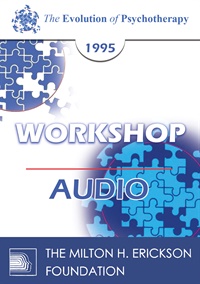
- Average Rating:
- Not yet rated
- Topic Areas:
- Workshops | Art and Creativity | Social Issues | Depression | Religion | Psychotherapy
- Categories:
- Evolution of Psychotherapy | Evolution of Psychotherapy 1995
- Faculty:
- James Hillman, PhD
- Duration:
- 2 Hours
- Format:
- Audio Only
- Original Program Date:
- Dec 14, 1995
- Short Description:
- This workshop is a phenomenology of melancholy. Jungian approaches to depression; clinical treatments, societal implications, resistances, suicidal risks and practical techniques will be demonstrated. The 50-minute, prizewinning BBC Documentary "Kind of Blue," narrated by the presenter will be featured.
- Price:
- $15.00 - Base Price

- Average Rating:
- Not yet rated
- Topic Areas:
- Invited Addresses | History of Psychotherapy | Psychotherapy | Therapist Development
- Categories:
- Evolution of Psychotherapy | Evolution of Psychotherapy 1990
- Faculty:
- Rollo May, PhD | James Hillman, PhD
- Duration:
- 1 Hour 6 Minutes
- Format:
- Audio Only
- Original Program Date:
- Dec 16, 1990
- Short Description:
- Epicurus, Kierkegaard, and Nietzsche are forefathers of contemporary psychotherapy. Freud was aware of these wellsprings of modern therapy, and Jung brings them specifically into his writing and his methods. We not only get hints from these forefathers, but we also find a lasting base in them, such as Bubar's "l-thou" construct or Kierkegaard's emphasis on the ultimate relationship of the self to life. These ideas are assumed in Freud, Jung, Adler, Rank, Fromm and other leading therapists in our day. It is these latter therapists who have given us the web of ideas which underlie contemporary psychotherapy.
- Price:
- $15.00 - Base Price

- Average Rating:
- Not yet rated
- Topic Areas:
- Invited Addresses | Consciousness | Psychotherapy | Relationships
- Categories:
- Evolution of Psychotherapy | Evolution of Psychotherapy 1990
- Faculty:
- James Hillman, PhD | Alexander Lowen, MD
- Duration:
- 1 Hour 30 Minutes
- Format:
- Audio Only
- Original Program Date:
- Dec 15, 1990
- Short Description:
- Psyche has been located wholly intrapersonally (within the individual} or interpersonally (between persons, families, groups}, but never is it conceived also extra-personally as a component of the world, as a world soul or anima mundi in the classical sense.
- Price:
- $15.00 - Base Price

- Average Rating:
- Not yet rated
- Topic Areas:
- Clinical Presentations | Dreamwork | Psychotherapy | Supervision
- Categories:
- Evolution of Psychotherapy | Evolution of Psychotherapy 1990
- Faculty:
- James Hillman, PhD
- Duration:
- 53 Minutes
- Format:
- Audio Only
- Original Program Date:
- Dec 14, 1990
- Short Description:
- Educational Objectives: To learn a Jungian-Archetypal approach to dream and/or fantasy material To view basic moves of supervision, and with the dreamer from a Jungian-Archetypal perspective
- Price:
- $15.00 - Base Price
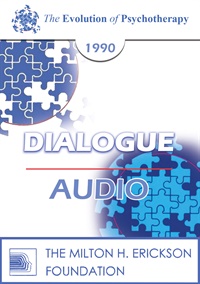
- Average Rating:
- Not yet rated
- Topic Areas:
- Dialogues | Social Issues | Psychotherapy
- Categories:
- Evolution of Psychotherapy | Evolution of Psychotherapy 1990
- Faculty:
- James Hillman, PhD | Thomas Szasz, MD
- Duration:
- 59 Minutes
- Format:
- Audio Only
- Original Program Date:
- Dec 14, 1990
- Short Description:
- Dialogue 06 from the Evolution of Psychotherapy 1990 - The Politics of Psychotherapy: Negative Effects and Intended Outcomes, featuring James Hillman, PhD, and Thomas Szasz, MD. Moderated by W Michael Munion, MA
- Price:
- $15.00 - Base Price
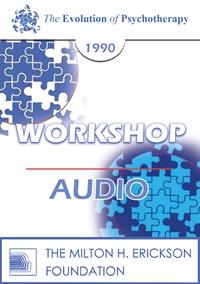
- Average Rating:
- Not yet rated
- Topic Areas:
- Workshops | Dreamwork | Psychotherapy
- Categories:
- Evolution of Psychotherapy | Evolution of Psychotherapy 1990
- Faculty:
- James Hillman, PhD
- Duration:
- 2 Hours 34 Minutes
- Format:
- Audio Only
- Original Program Date:
- Dec 14, 1990
- Short Description:
- Participants should bring dreams, especially those that have animal images in them. Work will consist of using traditional and contemporary Jungian methods of dream-work and active imagination.
- Price:
- $15.00 - Base Price
Tags: Dreams Psychotherapy James Hillman



